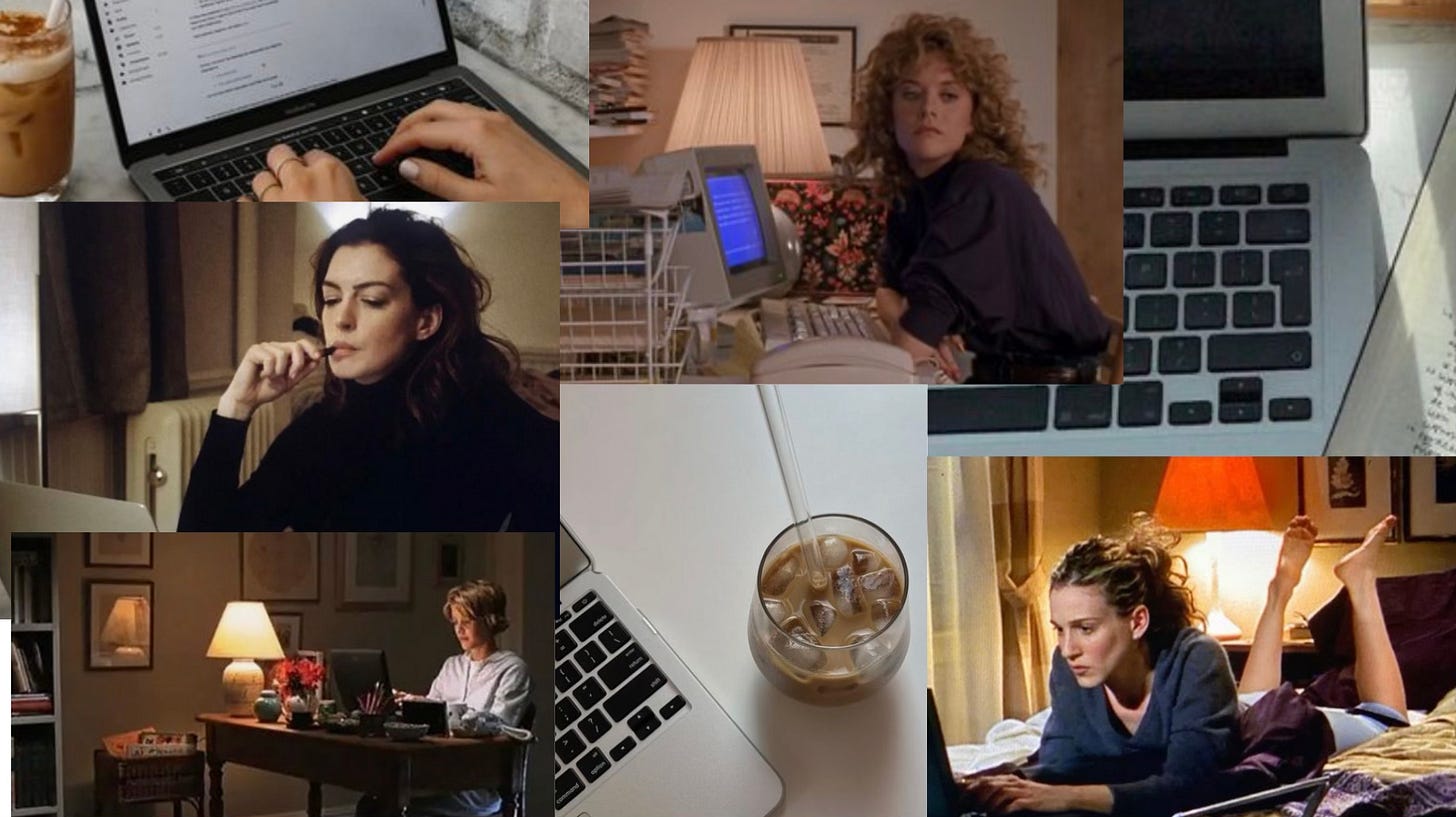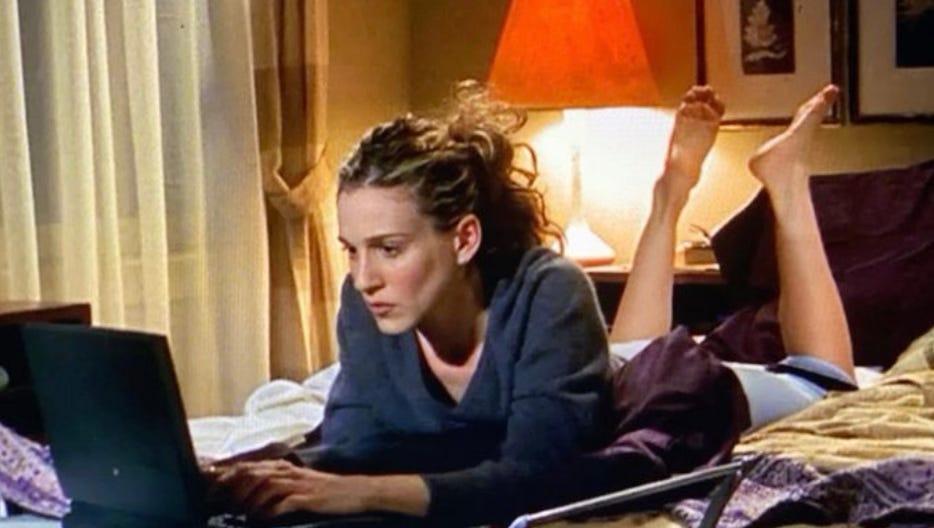Are you still a writer if you use ChatGPT?
A Content Writer’s thoughts on AI and creativity
**Little bit of context, I go into detail about this further down in the piece, but I personally, don’t use ChatGPT/AI for my own writing — partly because I’m a control freak, partly because it’s not a process I ever feel the need to speed up, and partly because the bit I like most about writing is the crafting of the actual words. Work tasks are another story, but it’s all covered in the essay. All I ask is that you head into this prepared to hear me out… **
Are you still a writer if you use ChatGPT?
A Content Writer’s thoughts on AI and creativity
If you asked me what my dream life looks like, I’d tell you this: I’m still a writer, but I’m a writer written and directed by Nora Ephron.
I spend my days scribbling handwritten notes and story ideas in worn-out notebooks that I scatter around my old, charming house, smudged ink blurring my best lines because I am just sooo analogue. Maybe it’s the cottage from The Holiday, I don’t know, but I definitely have an old range cooker with an iron kettle perched on top of it. I’m always wearing jumpers. When I need to research something, I research it in old books at the library and the librarian greets me by name. LinkedIn doesn’t exist.
My reality, however, is different — much less quaint and a lot more reliant on technology.
For one, I’m a Content Marketer for a corporate company. I write exclusively on a Mac. On top of that, my background is Tech PR. If I had a stovetop kettle, the noise of it would disturb the many, many Teams calls I have every day.
The point of all of this is, I’m a writer, but I’m not half as cosy-writer-lit-girl-thought-daughter as I’d like to be. And that’s not going to change any time soon, because modernity is convenient — it’s quicker to edit on a laptop, easier to research on Google, and I regularly use ChatGPT as my own personal assistant.
I’m not the only one, either.
Everyone in my industry is asking what impact AI will have on creation, and specifically, where that leaves the creators.
Now, I don’t care about the answer to this question quite as much when we’re talking about using AI for company blogs or SEO friendly web pages. But, when we’re talking about generative AI’s capability to make art, fiction, music, or anything else creators spend time putting their whole heart into, the conversation feels a lot more important.
As someone who spends hours on creative pursuits — and places genuine value on artistic creation, not as a commodity but as a balm — I don’t want to see a computer producing something that would take me or any other writer 3 years to write in 10 seconds flat. I also don’t want to see fiction charts lined with computer generated stories that a machine flung together using the work of actual creatives. I find the concept horrifying.
But, as someone who has also spent a lot of time thinking and writing about AI, I also know it’s not really that simple.
For context, though I don’t use AI for my own creative writing, I do use it for work. Not for “writing”, as such —I rarely use it to phrase anything from scratch. Partly because I’m a control freak, and partly because it takes a lot of prompting for it to move away from cliches and banalities.
Instead, I use AI for research (that I fact-check), for organising transcripts, and most often, for finding a word I know exists but can’t quite remember.
I’ve also been known to use it to typo-proof long texts I’m sick of staring at, to write quick invites or emails based on a template I created first, and even to draft bad versions of a project I’m stuck with, in the hope that it’ll trigger an idea about what I do want.
So, I have a question for you. If I come up with an initial idea, decide on tone/messaging/format/structure myself, and write my own draft, but every now and then, I add a word or phrase or statistic I asked AI for, can I still claim the end product is 100% my own work?
I think so. And if you agree with me, then at what point would it stop being my work? Is it when I let AI phrase a full sentence? When I let it write a whole paragraph? Two paragraphs?
Or, let’s swap it round. Say I gave AI a topic and asked it to provide a blog outline for me. If I used that AI-generated outline to draft a piece using my own words entirely, was that work written by me, or by AI? And should different standards apply when we’re talking about works of creative fiction, rather than marketing content?
I don’t know the answer to these questions.
I do know I want to be on the side of the humans, always. I think writing, specifically creative writing, is more valid when a human builds it from scratch because I am fundamentally interested in what humans have to say and how they express it. And yet, that’s arrogant, no? Who am I to say work made, in part, by a machine isn’t valid? I certainly don’t think digital artists are any less credible than painters because they use technology as a tool.
Part of me thinks, if someone comes up with creative prompts and uses AI to write a story they want to tell, they’re acting as a creative director of sorts. Generating a whole novel by giving AI specific instructions that prompt the technology to generate the story exactly how you want it might not be “writing” in the most technical sense, but it’s got to count for something.
And if you’re not a writer in that scenario, what are you?
Arguably, creative writing has no rules, which muddies the waters of my argument slightly, because in theory, you’re just as much of a writer as anyone else even if your process is unorthodox. Even without AI, it’s entirely possible to form an engaging narrative arc without writing your own prose.
In The Real Lolita: The Kidnapping of Sally Horner and the Novel That Scandalized the World, Sarah Weinman tells the story of the kidnapping that inspired Lolita using only historical documents and real evidence — and it’s still, quite rightly, her name on the book. Similarly, I could tell a story about misogyny (easily) using only real life Hinge messages I’ve been sent in the past week.
That would be my own work, right? Because I’m the one that pulled a story out of the materials available to me and put it together in a creative way, etc etc etc. But, I wouldn’t have actually written a word of it.
So, based on that logic, if people are telling creative stories, but they’re using AI to do it, I kind of think they’re still writers. Or if not writers, then definitely artists.
I recently read an article in which journalist Vauhini Vara, talks about how she used OpenAI to tell the story of her sister’s death. It’s a really, really interesting read, and I’d encourage anyone to take a look. What stuck with me, however, was Vara’s writing process, and where AI comes into it.
From the article itself:
“I typed a bit, tapped a button, and GPT-3 generated the next few lines. I wrote more, and when I got stuck, tapped again. The result was a story about a mom and her son hanging out at a playground after the death of the son’s playmate. To my surprise, the story was good, with a haunting AI-produced climax that I never would have imagined. But when I sent it to editors, explaining the role of AI in its construction, they rejected it, alluding to the weirdness of publishing a piece written partly by a machine. Their hesitation made me hesitate too.”
You only need to read, like, a sentence of Vara’s work to know she is a 100% legitimate, talented writer, AI or no AI.
In the same article, she talks about how literary critic and fiction writer, Adam Dalva, uses OpenAI to generate images of scenes he imagines. He then refers to those images when writing descriptions. Is that cheating? Or is it an extremely creative way to work? I think it’s the latter, and actually, no different from drawing inspiration from a physical location in real life.
Now don’t get me wrong, I don’t want to like AI — I’m too attached to my romanticised image of myself in my imaginary literary cottage. And I know that there are a lot of issues I haven’t really touched on here — copyright infringement, data bias, water consumption, etc.
But, just looking at whether or not AI heralds the death of creativity specifically, I’m saying no.
Writers will always find creative ways to tell their stories. Just spending a week on Substack will confirm that — I’ve read countless mind-blowing pieces that AI couldn’t possibly recreate. Where there is good writing, there will always be some creative genius of a human pulling the strings behind the scenes. And if any of those creative genius types choose to experiment with new and modern storytelling tools, just know, I’m still going to call you a writer.
GOD thanks for sticking with me. This felt like a mammoth piece to write. It’s a nuanced topic, and I had to fight the urge to just go down the “AI bad, human art good” path at every step. But, it’s conversation I’m very interested in, and I’m always up for a crazy deep introspective chat about it.
So, with that in mind, please please please tell me what you think about this! How much AI assistance is too much AI assistance? At what point is a piece no longer your own work? Is there still hope for creativity and literature? Let’s go to war in the comments x






I believe technology is merely supposed to help us, it’s up to us to commit to the work and do it
anyone who has used Chat GPT, for work or otherwise, knows that it won't be replacing jobs or artists anytime soon. they insist on us using it at work and it honestly just slows me down by the time I add more prompts and direction
on top of that, AI tools have been involved in writing for longer than most people think. spellcheck and Grammarly come to mind. could anyone say your work is not 100% your own if you used spellcheck to help along the way? I think not!